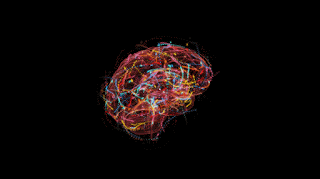 |
| davidope for Quanta Magazine |
Topics: Biology, Neuroscience, Quantum Computer, Quantum Mechanics
Note: With the exception of the historical links below, I don't have anything related to physics and Thanksgiving. Enjoy the food and links. Travel safe.
The mere mention of “quantum consciousness” makes most physicists cringe, as the phrase seems to evoke the vague, insipid musings of a New Age guru. But if a new hypothesis proves to be correct, quantum effects might indeed play some role in human cognition. Matthew Fisher, a physicist at the University of California, Santa Barbara, raised eyebrows late last year when he published a paper in Annals of Physics proposing that the nuclear spins of phosphorus atoms could serve as rudimentary “qubits” in the brain — which would essentially enable the brain to function like a quantum computer.
As recently as 10 years ago, Fisher’s hypothesis would have been dismissed by many as nonsense. Physicists have been burned by this sort of thing before, most notably in 1989, when Roger Penrose proposed that mysterious protein structures called “microtubules” played a role in human consciousness by exploiting quantum effects. Few researchers believe such a hypothesis plausible. Patricia Churchland, a neurophilosopher at the University of California, San Diego, memorably opined that one might as well invoke “pixie dust in the synapses” to explain human cognition.
Quanta Magazine: A New Spin on the Quantum Brain, Jennifer Ouellette
Completely unrelated to anything but the day:
Manataka American Indian Council on Thanksgiving
What Really Happened at the First Thanksgiving? The Wampanoag Side of the Tale
Gale Tourey Toensing
Comments